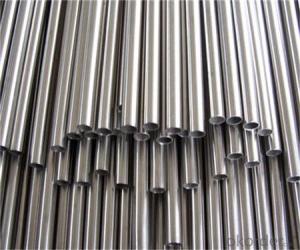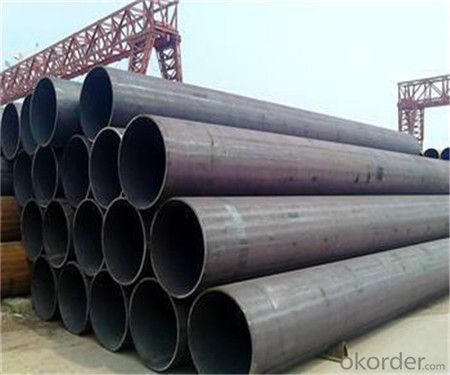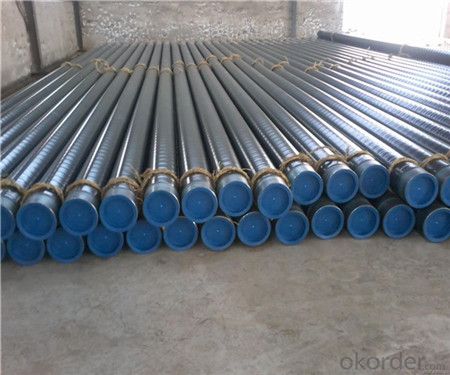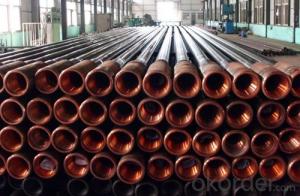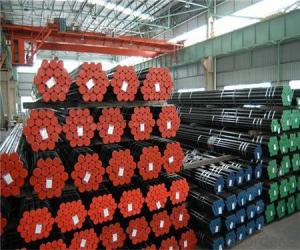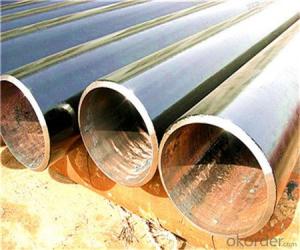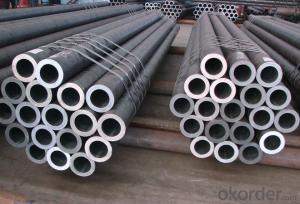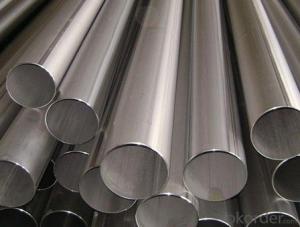Steel Pipe with API 5L-0733 / A53 /A106 from CNBM
- Loading Port:
- Tianjin
- Payment Terms:
- TT OR LC
- Min Order Qty:
- 25 m.t.
- Supply Capability:
- 20000 m.t./month
OKorder Service Pledge
OKorder Financial Service
You Might Also Like
1、Structure of API 5L-0733 Steel Pipe:
Seamless pipe is formed by drawing a solid billet over a piercing rod to create the hollow shell. As the manufacturing process does not include any welding, seamless pipes are perceived to be stronger and more reliable. Historically seamless pipe was regarded as withstanding pressure better than other types, and was often more easily available than welded pipe.
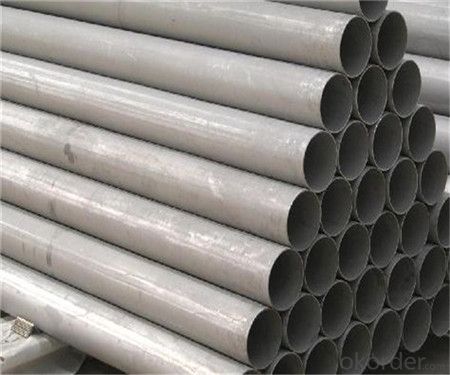
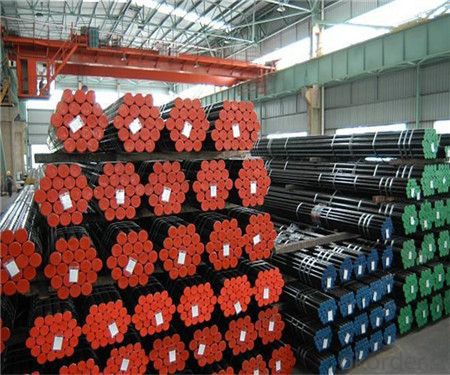
2、Main Features of API 5L-0733 Steel Pipe:
• High manufacturing accuracy
• High strength
• Small inertia resistance
• Strong heat dissipation ability
• Good visual effect
• Reasonable price
3、Packaging & Delivery
Packaging Details: | seaworthy package,bundles wrapped with strong steel strip |
Delivery Detail: | 15-30days after received 30%TT |
4、 API 5L-0733 Steel Pipe Specification:
Standard | GB, DIN, ASTM ASTM A106-2006, ASTM A53-2007 |
Grade | 10#-45#, 16Mn 10#, 20#, 45#, 16Mn |
Thickness | 8 - 33 mm |
Section Shape | Round |
Outer Diameter | 133 - 219 mm |
Place of Origin | Shandong, China (Mainland) |
Secondary Or Not | Non-secondary |
Application | Hydraulic Pipe |
Technique | Cold Drawn |
Certification | API |
Surface Treatment | factory state or painted black |
Special Pipe | API Pipe |
Alloy Or Not | Non-alloy |
Length | 5-12M |
Outer Diameter | 21.3-610mm |
Grade | 20#, 45#, Q345, API J55, API K55, API L80, API N80, API P110, A53B |
Standard | ASME, ASTM |
1) Material:20#(ASTM A 106/A53 GRB.API5LGRB,GB),45#,16Mn,10#.
2) Specification range:OD:21.3-610mm,WT:6-70mm,length:6-12m or according to the requirement of clients.
3) Excutive standards:GB,ASME API5L.ASTM A 106/A53,Despite of the above standards,we can also supply seamless steel pipe with standard of DIN,JIS,and so on,and also develop new products according to the requirements of our clients!
4) Surface:black lacquered,varnish coating or galvanized.
5) Ends:Beveled or square cut,plastic capped,painted.
6) Packing:bundle wrapped with strong steel strip,seaworthy packing.
5、FAQ of API 5L-0733 Steel Pipe:
①How is the quality of your products?
Our products are manufactured strictly according to national and internaional standard, and we take a test
on every pipe before delivered out. If you want see our quality certifications and all kinds of testing report, please just ask us for it.
Guaranteed: If products’ quality don’t accord to discription as we give or the promise before you place order, we promise 100% refund.
②How about price?
Yes, we are factory and be able to give you lowest price below market one, and we have a policy that “ for saving time and absolutely honest business attitude, we quote as lowest as possible for any customer, and discount can be given according to quantity”,if you like bargain and factory price is not low enough as you think, just don’t waste your time.Please trust the quotation we would give you, it is professional one.
③Why should you chose us?
Chose happens because of quality, then price, We can give you both.Additionally, we can also offer professional products inquiry, products knowledge train(for agents), smooth goods delivery, exellent customer solution proposals.Our service formula: good quality+good price+good service=customer’s trust
SGS test is available, customer inspection before shipping is welcome, third party inspection is no problem.
- Q: Are steel pipes suitable for underground industrial waste disposal?
- Due to their durability and strength, steel pipes find frequent use in underground industrial waste disposal. Their ability to withstand harsh underground conditions, such as moisture, pressure, and corrosion, is noteworthy. Furthermore, steel pipes exhibit resistance to chemical reactions, making them well-suited for managing diverse types of industrial waste. In this manner, they can effectively transport and confine hazardous materials, thereby guaranteeing the safety and safeguarding of the environment and its surroundings. Overall, steel pipes are widely acknowledged as a dependable and effective choice for underground industrial waste disposal.
- Q: What is the maximum length of steel pipes available in the market?
- The market offers steel pipes in varying maximum lengths, which are influenced by factors like steel type, manufacturing capacity, transportation restrictions, and customer demands. Generally, steel pipes can be produced up to 12 meters (40 feet) or even longer. However, it is crucial to consider that handling and transporting longer lengths might pose challenges, necessitating specialized equipment or techniques. Ultimately, the industry and customers' specific requirements and capabilities determine the maximum length of steel pipes available in the market.
- Q: How are steel pipes used in the construction of geothermal power plants?
- Steel pipes are used in the construction of geothermal power plants primarily for two purposes: transporting geothermal fluids and ensuring the structural integrity of the plant. The pipes are used to extract hot water or steam from the geothermal reservoir deep underground and transport it to the surface. These pipes are designed to withstand high temperatures and pressures associated with geothermal fluids. Additionally, steel pipes are also used to distribute the extracted fluids to various parts of the power plant for electricity generation. Moreover, steel pipes are utilized in the construction of the plant's infrastructure, such as the framework, supports, and other structural components, ensuring the overall stability and durability of the geothermal power plant.
- Q: How are steel pipes used in the automotive exhaust systems?
- Steel pipes are commonly used in automotive exhaust systems because steel is a durable and heat-resistant material. Steel pipes are used to transport the exhaust gases from the engine to the muffler and tailpipe, ensuring that the gases are safely and efficiently expelled from the vehicle. These pipes are designed to withstand high temperatures, corrosion, and vibration, making them an essential component in the exhaust system.
- Q: Seamless steel tube 89X4 meters, how heavy?
- Generally seamless steel pipe wall thickness will be uneven, according to the theory, each meter is 8.3844 kilograms, but if the wall thickness is poor 20--30 wire, then the weight will increase some
- Q: Are steel pipes fire resistant?
- Yes, steel pipes are fire resistant. Steel is a non-combustible material, meaning it does not catch fire or contribute to the spread of flames. Steel pipes have a high melting point and are able to withstand extreme temperatures, making them suitable for use in applications where fire resistance is required. Additionally, steel is a durable material that does not degrade or lose its structural integrity when exposed to fire. This makes steel pipes a common choice for fire protection systems, such as sprinkler systems in buildings, as well as for industrial applications where fire hazards are present.
- Q: What are the common uses of steel pipes in construction?
- Steel pipes are commonly used in construction for various purposes such as carrying water, gas, and sewage, as well as for structural support in building frameworks, bridges, and underground piping systems. They are also used in the transportation of fluids and materials, making them essential in industries like oil and gas, manufacturing, and infrastructure development.
- Q: Can steel pipes be used for conveying corrosive substances?
- Steel pipes can be used for conveying corrosive substances, but it is important to choose the right type of steel and consider additional protective measures. Stainless steel pipes, for example, are highly resistant to corrosion and can handle a wide range of corrosive substances. However, it is crucial to consider the specific corrosive properties of the substance being conveyed and the concentration levels. In some cases, additional protective coatings or linings may be necessary to prevent corrosion and ensure the longevity of the steel pipes. Regular maintenance and inspection are also essential to detect and address any signs of corrosion to prevent leaks or failures in the piping system. Overall, steel pipes can be used for conveying corrosive substances, but proper material selection, protective measures, and maintenance are vital to ensure safe and efficient operations.
- Q: What is the difference between steel pipes and concrete-lined pipes?
- The main difference between steel pipes and concrete-lined pipes lies in their composition and protective features. Steel pipes are typically made entirely of steel, providing strength and durability. On the other hand, concrete-lined pipes consist of a steel pipe coated with a layer of concrete. This lining offers additional protection against corrosion and abrasion. While steel pipes are more suitable for high-pressure applications and offer better resistance to external factors, concrete-lined pipes are commonly used in wastewater systems to prevent corrosion and extend the lifespan of the pipe.
- Q: Is the steel frame on each floor supporting formwork (floor) called full scaffolding?
- After the use of full scaffolding, more than 3.6 meters of interior wall decoration is no longer calculated decorative scaffolding, and the interior wall of the scaffolding is still in accordance with the provisions of the scaffolding.
Send your message to us
Steel Pipe with API 5L-0733 / A53 /A106 from CNBM
- Loading Port:
- Tianjin
- Payment Terms:
- TT OR LC
- Min Order Qty:
- 25 m.t.
- Supply Capability:
- 20000 m.t./month
OKorder Service Pledge
OKorder Financial Service
Similar products
Hot products
Hot Searches
Related keywords
